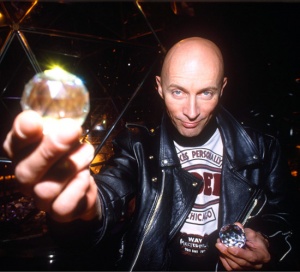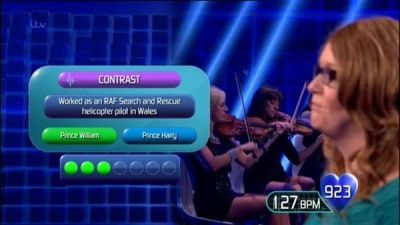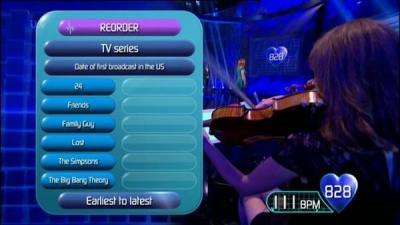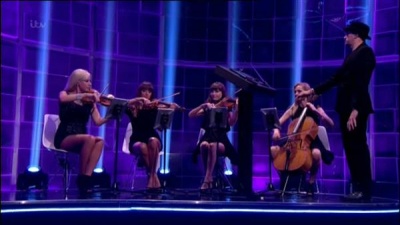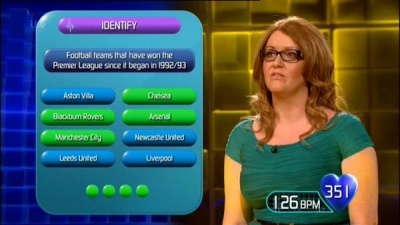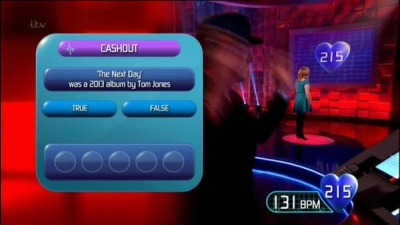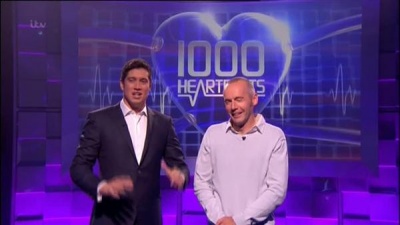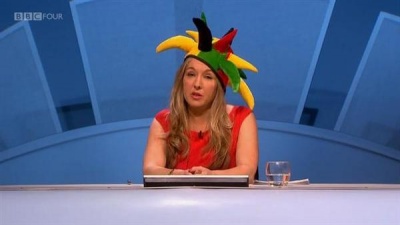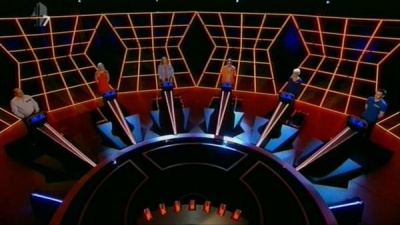Weaver's Week 2015-03-15
Last week | Weaver's Week Index | Next week
Our thoughts are with ten people killed this week in a helicopter crash. Two aircraft hit each other while filming for the French version of Dropped.
The crash, in Argentina, killed three sportspeople: Camille Muffat (swimmer), Alexis Vastine (boxer), and champion sailor Florence Arthaud. Five members of the Adventure Lines Productions staff were also killed: Laurent Sbasnik, Lucie Mei-Dalby, Volodia Guinard, Brice Guilbert and Edouard Gilles. So were the Argentine pilots: Juan Carlos Castillo and Roberto Abate.
Broadcaster TF1 released a brief statement. "We learn with immense sadness of the accident that occurred during the filming of the show Dropped. Our staff come together in this terrible time with the pain of the families and those close to the victims."
We had planned to review the ITV show Mission Survive this week, a programme with similarities to Dropped. We've not been able to finish that review to a suitable standard. Instead, let's go for the hit show of the moment.
Contents |
1000 Heartbeats
Hungry Bear Media for ITV, from 23 February
Since time immemorial, game shows have measured time in a linear fashion. One second, two seconds, three and four. Thirty second Countdown. Just a Minute. Three minutes to win the time crystal.
1000 Heartbeats uses a different clock, one that doesn't come from the pulsing of an idealised caesium atom. This show's clock comes from the contestant, and the pulse of their own pulse. The player is allowed one thousand of their own heartbeats to win a tidy cash prize.
The heart is an intrinsic timer, one that the contestant can (in theory) control. Want a little more time for this puzzle? Just slow your pulse. But how can you do that, when your brain is crying out, "More blood! Help me think!" Will this player have mind over matter, or will the heart rule the brain?
It's a brilliant conceit, the player's mind is working for them, but their body is working against them. The late great French designer Jacques Antoine built his career (and the Adventure Line company) around separating the brain and the body, and we think he would approve of this idea.
From this tremendous idea, the execution almost had to be a slight disappointment. That's not a slight against anyone involved, just that there have to be compromises and constraints to bring the show to fruition. Our criticism comes from a place of "we want this show to be even better than it is, and it's blimmin' good."
The first blimmin' good element is Vernon Kay. One of the safest hosts in game show land, Vernon can empathise with a contestant and understands the format inside out. To help advance the plot, we hear Vernon confirm the progress of the round, we think these calls are added in post-production.
He doesn't need to read out any of the questions. That job falls to Dilly Barlow, a voiceover selected for her ice-cold sound and very clear enunciation. Ice-cold and clear, but we find the precision is a beat too slow and sometimes holds back the game.
The format of 1000 Heartbeats is to complete a number of small challenges, for increasing rewards. Every player begins with Contrast, statements about two options. For instance, given "Phillip Schofield" and "Andy Crane", the player might hear "Presented Going Live!", to which the correct response is Phillip Schofield. Or "In a song, has got no brain", Andy Crane the answer.
The player needs to give seven correct responses to bank £250. An incorrect answer incurs a penalty of 25 heartbeats, and the further penalty of having to hear another statement. It appears to be legal to interrupt the statement, but very few contenders ever do.
At this point, alternative games appear. Round two could be Reorder. Given six options, and an order to put them in, the player orders the items from top to bottom. There are still 25 heartbeats for an incorrect choice, for instance suggesting that "Prisoner of Azkhaban" was published before "Chamber of Secrets". Each game is played while standing on a special plate, and the player can step back to throw out the question. This will cost 50 beats, and the show doesn't always give the answers to a part-finished round.
Unravel is the other £500 game. A word is spelled out in a circle, and the contender's job is to find the word. Six words complete the round. This game has already given 1000 Heartbeats its viral video, a contestant who cannot unravel a short form of poetry:
Hmm...
Two other points from that video. First, note how the O and D of "FOLDER" look almost identical. The show's typeface is very stylish, to the point that the style compromises substance.
Also, note how it's not just Vernon who is holding back the giggles. There are four people playing string instruments, and one man waving his conductor's baton. They are Sarah Chapman and Catriona Parker (violin), Hayley Pomfrett (viola), Llinos Richards ('cello), and Paul Farrer (conductor). Yep, the same Paul Farrer who wrote the music for The Weakest Link and The Chase, and who had the genius idea to measure time in heartbeats.
The string quartet is in the studio, playing a different piece live during each round. The speed they play is dictated by the conductor, and he's working to the speed of the player's heart. So if your heart beats faster, the music will speed up, it'll all get more exciting.
Back to the show. Round 3 is for £1000, and requires five correct answers. Everyone who played Unravel will go on to Assemble – see a picture of a celebrity, it'll be chopped up into pieces, some pieces will be put round the outside and the player's to fill in the blank. There will also be distraction pieces, drawn from the same image but these don't fit the spaces.
Other players are likely to reach Unscramble, five anagrams on a theme. There's a clue available (turning "Art" into "Impressionist painters") at 25 beats. Should a player step off mid-round, they only need a total of five answers – three on the first board and two on the second will do fine.
Round four is for £2500. In Link, two columns of six answers can be paired up – for instance, songs with colours and their performers. Only four of the answers in each column match, the others are there to distract and confuse. Four is the number in Identify, find the four real members of Enid Blyton's Secret Seven from the list of eight names. We've heard mention of Decode, four clues to right answers from a list of seven, but haven't seen this ourselves.
Mathematics is the game in round five, where £5000 is on offer. Pinpoint has some coloured balls with numbers inside, and asked to do something with some of the balls. "Add the green balls", or "Multiply the highest odd ball with the lowest even ball". Here, "highest and lowest" are used in the sense of "largest and smallest", not "top and bottom of the screen". Three grids need to be cleared, each takes five answers.
Keep Up takes a number, does a simple mathematical operation (add, subtract, multiply, divide), and generates another number. The next question starts with this number. Three sequences of eight sums complete the round.
The rules slightly change at this point: if a player steps off part-way through a Keep Up sequence, or a Pinpoint grid, they restart with a fresh grid from scratch. All the work they've done on that part is lost, as are the beats.
The player must also consider how Dilly will read as much of the question as she can before calling "Play". This is a particular drag in Decipher, the only £10,000 game. Five statements, but only one will fit (or not fit) a question. Dilly reads the statements, and the question, and only after a good long time calls "play". Two correct answers will win the round.
Recall is the £25,000 game, remembering a sequence of eleven letters and numbers. This hasn't (yet) been played, only demonstrated.
But there's more. The money won is only in the player's bank. They've still got to play Cashout to take that dosh home. Cashout is won by answering five true-false questions correctly in a row. Break the chain of correct answers, and the player must form a new chain from scratch. The game's still played against the remaining beats, and there's still a 25-beat penalty for an incorrect answer.
The result is a Really Difficult endgame. Our first sight of 1000 Heartbeats was someone playing this endgame. Our last sight on that show was someone playing the endgame, and a third player took it on in the middle. All three players lost. It's an unusual situation, but not unprecedented.
There are ways to make it easier, to give more winners. Not start the pulse clock until the player gives a wrong answer, and this keeps alive the chance that a player taking 5 beats can still win. Or make the player an offer (with 228 beats, and £2500 in play, would they take £300 guaranteed?) Or make Cashout require a shorter chain for getting through later rounds: perhaps make it so rounds plus cashout was always 9.
On further viewing, we found more frustrations. The games are just that bit too limited. We've become bored during the explanation of Reorder because we heard exactly the same speech not 20 minutes ago. Either have the same games for everyone (and explain the first time they appear on a show) or have enough variety to not see the same game so often. Pressure Pad had it about right, when we saw games about twice a week, no two shows had the same challenges. Assuming 1000 Heartbeats comes back for another run, we hope for more variety.
But let's not carp. 1000 Heartbeats is an outstanding idea, elegant and subtle and with depth. It's presented clearly and has other gimmicks to draw attention. Best new show of the (still-young) year? Quite possibly.
It's Debateable
Rather than have politicians at podiums, we cast them in game shows.
7) 1000 Heartbeats
"You've sent him? There is something of the night about him." The host adjusted his collar, and settled down to watch. £25,000 was almost certain to reach the contestant; if he made forty errors, Vernon worried he might lose his neck. The string quartet filed out: they have nothing to do when the player has no heartbeat.
Mastermind
Semi-final 5
Two weeks until the final. Who's next?
Ian Clark researched the Life of Earnest Hemingway and made 8 (0). He won on 12 September taking the Siege of Constantinople, and ran his score to 30 points. Not quite that good tonight, finishing on 18 (3).
Hywel Morgan answered on the town with The League of Gentlemen, a radio series from 1998. It's since moved to television, film, and other visual media. The contender knows his sketches, scoring 9 (1). He won on 17 October with the composer Steve Reich, but not tonight – the second phase only takes him to 16 (0).
Paula Keaveney took the Harry Devlin novels of Martin Edwards, detective stories published in the last quarter-century. Nodding as she knows many answers, she reaches 9 (0). Paula won a tie-break on 22 August after taking The Thick of It, but tonight has a pass spiral early on, and finishes on 17 (7).
John Benyon studied the Romanov dynasty, rulers of Russia until 1917. And studied it well – he has 10 (0). He's our final loser, falling just short on 3 October when he took King Ludwig II of Bavaria. He's giving it his best tonight, taking the total to 23 (0)
Tom Parker took the short trip to the Theatre of Nightmares to research Manchester United under Alex Ferguson. 11 (0). Winner on 30 January with Game of Thrones, Tom gets some, passes, misses one, gets more, misses another, gets more, and misses a third. And that proves fatal. His final score is 22 (1).
So John Benyon progresses to the final by a single point.
Advance notice: the final will go out on 27 March, and it will be an hour long, but it's scheduled for the later hour of 9pm.
We have to lose the scat solo
Can i Gymru, the Welsh song contest, took place last Saturday. The winning song was "Y Lleuad a'r Ser" by Elin Angharad and Arfon Wyn, performed by Elin Angharad. It's the most middle-of-the-road, bland, inoffensive song, one we had completely forgotten by the time it finished.
The contest had an unusual structure, one designed to pick a tedious tune. Eight songs were performed, with an indicative hashtag vote having absolutely no significance. The judging panel picked four to hear again, and the final result was an equal split between the jury and the televote. Unusual for the UK, standard for foreign song competitions, such as national Eurovision selection shows. Eight ran.
The BBC confirmed its entry to the senior Eurovision Song Contest. "Still in love with you" (music and lyric: David Mindel and Adrian Bax White, performed by Electro Velvet). Mr. Mindel's works include the themes to the National Lottery shows, Food and Drink, Jim'll Fix It, Challenge Anneka, and Get Your Act Together. Adrian Bax White, a resident of Monaco, name-drops Narada Michael Walden, East 17, Rolf Harris, Shampoo, and Renato (but not Renee).
"Still in love with you" is an electro-swing number, which reminded us of mid-90s novelty "Doop" – we heard it once, wanted to hear it again, but know it'll tire us out very quickly. It's not waffly, it's not versatile.
Almost inevitably, the Eurovision fandom has raced to express its dismay. "Who are these people? Who are they? Who are they?" asked some, channelling their inner Nikki Grahame. "Couldn't we have sent {Kylie | Jason | Adele | Emeli | Sam}," asked others, before wishing for a ride on the invisible pink unicorn. "It's got no hook," said others, missing the massive hook in the first two seconds of the track. "Just hate it. I spent all night listening to it and I still hate," wittered some who should get some sleep.
The reason to have an internal selection is to pick a song that wouldn't come through a public selection. The UK Eurovision fandom sees the contest as a social event. From about the turn of the century, the viewing public – or the voting audience – put the party first, and didn't consider that it is a contest.
Since 2009, the BBC has selected its songs internally. They've found one surefire hit ("It's my time", 2009), one absolute stinker ("That sounds good to me", 2010), one middle-of-the-road plodder (Believe in me", 2013), and three decent songs compromised by poor performances. All of the songs have been safe, predictable, and as unsurprising as the Can i Gymru winner.
This year, the BBC is mixing it up, like the Welsh public did when they voted blues-goth act Jessop a'r Sgweiri two years back. The Beeb is playing the contest as it actually is, not the contest the local fans want to see.
"Still in love with you" is a risk. It's a high-energy song, the staging must be spot on otherwise it'll look messy. Last time Eurovision went electro-swing was NDR (Germany) in 2009, when Dita Von Teese did a striptease entirely off-camera (!) We have doubts about whether the BBC singers can perform the song well for two nights running, and whether they'll impress the jury with "vocal capacity". We're far from convinced about the scat section.
We can see this crashing to the bottom-right of the board. We can see it established on the left-hand side. We applaud the BBC for taking some risks, it's the most progressive song they've entered since "Where are you" in 1998.
This Week and Next
ITV has a new production company. Talpa Media has been sold to the UK broadcaster, and ITV is reported to have paid £355 million for the honour. Talpa was established by John de Mol, he wanted to sell his business so he can concentrate on coming up with brilliant formats like The Voice and Divided. The fruits of this union are already to be seen: Dance Dance Dance is a dance show for celebrities and their relatives, suspiciously similar to ITV's own Stepping Out (2013).
University Challenge happened. The final: Trinity College Cambridge have 105, Durham University have 145. Highlight was the answer "Kilometres per second per megaparsec".
On The Link, this happened.
- "Curtis Jackson III, Shawn Carter, Sean Combs, Marshall Mathers III"
- "Rappers?"
- "No. It's real names of rappers."
And this happened.
- "Shank, Thigh, Silverside, Sirloin"
- "Cuts of meat?"
- "No. It's cuts of beef."
This isn't good enough. Sloppy questions, imprecise and inconsistent adjudication. It leaves a bad taste in the mouth, it leaves viewers cheated and switching over to Tipping Point – a loser there has lost for impartial reasons. The Link comes across as a father-in-law's feeble efforts to best his son's wife. Give it up, Arthur, it's no longer funny, and you're just embarrassing Hermione Coren Mitchell. It'll get so bad that she won't talk to you.
Only Connect had its Comic Relief special. The Water Babies were Reeta Chakrabarti, Tom Holland and Patrick Marber; Katie Derham, Steve Pemberton, and Steve Jones (Only Connect captain) the Tillers.
The Tillers had the best of the connections round, getting pictures of whisky for three points, music from Bohemian Rhapsody for two, and two on people who flounced off telly shows. Water Babies got one from records the Sponsored World Records book doesn't recognise, and three from things renamed for Queen Elizabeth. They handed over womens names prefixed by a letter, so the Tillers led 8-4.
WwyamC, WwyamC, WwyamC, and the Tillers pick a bonus, AaHNY. (Checks calendar. "We wish you a merry Christmas" in March? Deactivate the Unified Field of Creep.) A bonus for the Water Babies on first second third fourth – Michelle Obama the first lady, 1939-45 the second world war, Harry Lime the third man, so fourth estate is fine.
Most common dismissals in cricket end in "caught", and two for the Water Babies. That makes two points for an English side on cricket, something we never thought we'd say. Most retweeted microblogs concludes with the Oscars selfie of 2014, and two for the Tillers.
Neither side scores on the last two sets. "People asked difficult questions by Jeremy Paxman" is the offer from the Water Babies, which isn't fourth in the sequence, and isn't right either. It's people who used to hold jobs subsequently occupied by David Cameron, a politician from London. Socialist, Trade Unionists, Jews, it's a poem "First they came for...", and ends with a piccie of question editor Mr. Connor.
The Tillers defend an 11-7 lead in the walls. They slowly pick out four Blue Peter presenters, and pick out parts of a watch. Are there some magazines, some football club owners? Breath is not a magazine (you're thinking of Breathe for airheads; and Skin is tattoo culture), these are things that can be saved, but the team do spot agendered names. Seven points!
Water Babies are right at home with the water wall, starting with mischievous creatures. They have things you can throw in sport, a hammer, a bail, a horse... lovely. There are types of nut, and homophones for drinks. "Walball and peaball" doesn't quite meet Victoria's approval. Seven points!
So 18-14 to the Tillers going into Missing Vowels. Three-name actors goes to the Tillers 4-0, and Don'ts for children is theirs by 3-0. Instructions on posted items, another Tillers win 2-0. Which means that Katie Derham has pretty much won the round on her own, taking the game by 27-14.
Shows That Won't Be Shown. The UKGameshows pixies have cleared out some of the shows we noted ages ago as "coming soon", but that have not been coming at all. We don't expect to see any of these, ever.
- You Can't Say That! – Tim Vine hides some trick questions alongside the genuine questions where if the contestants can spot the 'trip-ups' from the trivia, they could be winning thousands of pounds. (Hat Trick Productions)
- I Know Best – Rhod Gilbert invites the audience to compete against a panel of celebrity guests where they will try to convince the audience that they are telling them facts while the audience judges if the panel are lying. (Wall to Wall)
- Junk – Three comedians attempt to win bits of 'junk' donated by members of the studio audience. Joe Lycett hosts. (BBC3)
- The Totally Senseless Gameshow (sic) – Celebrities dress up as characters to play a series of "Totally Senseless" games while something else will make it even harder for them not to win any of the games. Martin Dougan hosts. (Roughcut Television for BBC3).
New BBC commissions The Beeb has announced its new slate of shiny programmes. Can't Touch This (Stellify Media for BBC1 Saturday nights) is a physical action game show. Five Star Family Reunion (12 Yard Scotland and Boom Cymru for BBC1) brings families together in a luxury location, or isolated rooms near Spaghetti Junction. Perfect Match (BBC Entertainment for BBC1) has couples matching a question to an answer.
More new BBC shows. Killer Magic (Objective for BBC3) has moved to a full series; we enjoyed the pilot on April Fools' Day last year. Airheads (So Television for BBC2) looks like the return of Scrapheap Challenge. The Hive (Green Inc and Saltbeef for BBC4) hides all its answers in plain sight.
BARB ratings in the week to 1 March.
- Call the Midwife was the most-seen single programme, 10.15m viewers eclipses the 8.45m for what is now the biggest production by ITV, BBC The Voice of UK.
- More simple tasks on Comic Relief Bake Off pulled 7.9m, 4.45m for The Big Painting Challenge, and a slightly disappointing 4.15m for The People's Strictly. 5.7m for Saturday Night Takeaway, the top game show on the ITV channel.
- A bundle of shows between 3 and 3.5m viewers – Let's Play Darts for Comic Relief, The Great British Sewing Bee, and University Challenge on BBC2, and on ITV The Chase With Celebs, Mission Survive, and Take Me Out.
- 2.8m for Only Connect on BBC2 would be a record, except it's not round or black or have a hole in the middle. 1.05m for Million Pound Drop on Channel 4.
- Top multi-channel game was Take Me Out The Gossip (590,000 on ITV2), ahead of The Voice repeated on BBC3 (525,000), and Hell's Kitchen (395,000 on ITV2).
Thanks to Daniel H at Bother's Bar for additional research. (He watched The Link so no-one else had to.)
Giant woodland creatures on Wild Things (The Satellite Channel, Sun). Classic episodes of Scrapheap Challenge emerge on the Quest channel, and Tipping Point repeats are on the Watch channel. Some French things on Friday: Questions Pour un Super Champion (TV5) and the first Eiffel Tower Ascent Race (Eurosport 2). ITV's BBC The Voice of Holland of UK begins its live shows (BBC1, 7.15 Sat)
Photo credits: Hungry Bear Media / Chatsworth Television / Birds Eye / NDR-Eurovision / STV / Presentable / Objective Productions Scotland.
To have Weaver's Week emailed to you on publication day, receive our exclusive TV roundup of the game shows in the week ahead, and chat to other ukgameshows.com readers, sign up to our Yahoo! Group.


